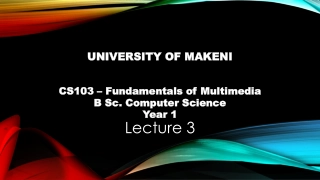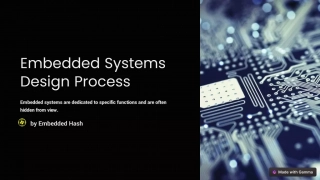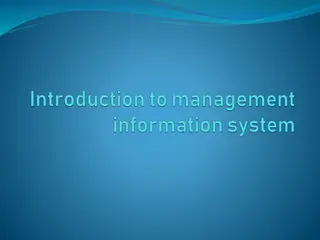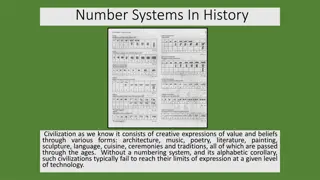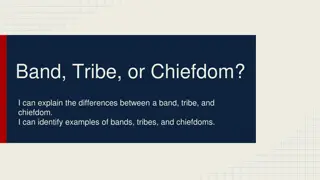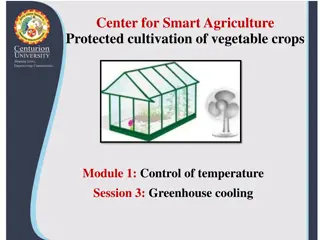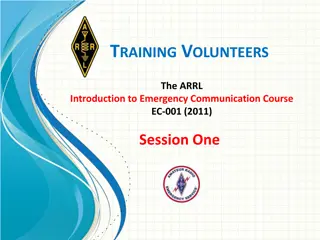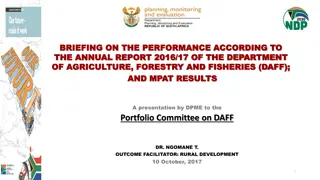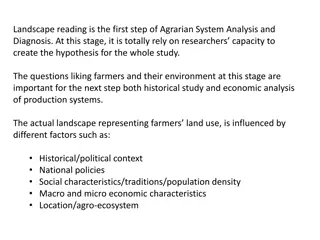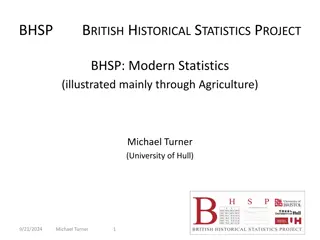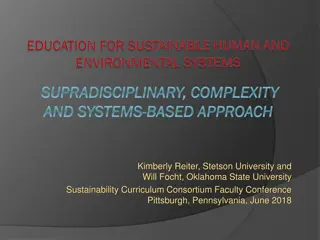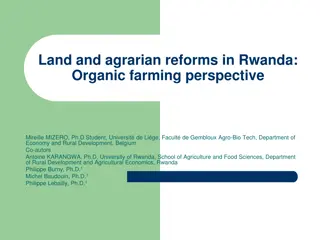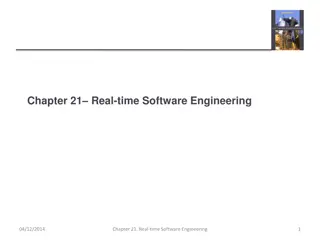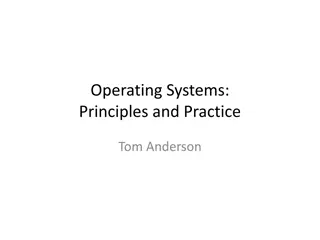Enhancing Food Systems for Improved Food Security and Job Creation
The importance of improving food systems to achieve sustainable development goals and enhance food security and job creation. It covers topics such as the current food systems, the impact of these systems, jobs in the food systems value chain, and key recommendations.
8 views • 24 slides
Understanding Multimedia Systems: Hardware and Software Components
Multimedia systems require specific hardware and software components to meet the demands of producing and playing multimedia content. Development systems are used for creating content with higher specifications, while playback systems are used for playing multimedia files with lower specifications.
8 views • 46 slides
Embedded Systems Design Process in the Embedded systems
Embedded systems are all around us, from the tiny microcontrollers in our household appliances to the sophisticated control systems in cars and aeroplanes. But how are these systems designed? Let's delve into the basics of the embedded systems design process in simple terms that anyone can understan
2 views • 9 slides
Agrarian Crisis, Distress, Unrest; Peasant Movements & Suicide
Agrarian crisis in India is deepening, leading to distress among farmers and sparking peasant movements. Factors such as climate dependence, land loss, and lack of government support are exacerbating the situation. Farmer suicides are on the rise due to massive indebtedness. The impacts are far-reac
2 views • 43 slides
Overview of Distributed Systems: Characteristics, Classification, Computation, Communication, and Fault Models
Characterizing Distributed Systems: Multiple autonomous computers with CPUs, memory, storage, and I/O paths, interconnected geographically, shared state, global invariants. Classifying Distributed Systems: Based on synchrony, communication medium, fault models like crash and Byzantine failures. Comp
9 views • 126 slides
Operating Systems
An operating system is a crucial program that manages all other programs on a computer. It handles tasks like input recognition, file management, and device control. There are different types of operating systems such as single-user, single-task systems, multi-user, multi-task systems, real-time ope
6 views • 11 slides
Understanding Information Systems in Organizational Management
Management in organizations is divided into three levels: operational, tactical, and strategic. Each level requires different information systems to support various activities. Operational systems focus on routine transactions and control processes, while middle-level systems aid in semi-structured
9 views • 39 slides
Understanding Negative Results in Systems Research
Systems research encompasses various areas such as operating systems, networking, and distributed systems. Negative results in systems research often go unpublished, leading researchers to focus on curating positive outcomes. This practice can hinder the credibility of scientific findings and impede
5 views • 23 slides
Explore the Top 5 Trends in Alarm Systems with Shellharbour Security Systems
Explore the latest trends in alarm systems with Shellharbour Security Systems. Learn about advancements such as smart home integration, wireless technology, AI-powered monitoring, and more. Stay informed to enhance your home or business security with cutting-edge solutions. Visit: \/\/shellharbourse
7 views • 8 slides
Understanding Management Information Systems (MIS)
Management Information Systems (MIS) are vital for collecting, processing, and analyzing data in business activities. They assist decision makers, facilitate communication, and maintain records. Components include people, data, business procedures, hardware, and software. Various types of informatio
2 views • 11 slides
Number Systems In History
Civilizations throughout history have expressed their values and beliefs through various creative forms like architecture, music, and literature. The development of numbering systems played a crucial role in advancing society's ability to communicate, track records, and engage in trade. From the ear
1 views • 17 slides
Social Organization: Bands, Tribes, and Chiefdoms Explained
In social organization, cultures have evolved through bands, tribes, and chiefdoms. Bands are small, egalitarian groups practicing hunting and gathering. Tribes support larger populations with agrarian lifestyles and temporary land ownership. Chiefdoms, the most complex, are stratified societies wit
1 views • 11 slides
Diversification of Bangladesh's Export Basket: Opportunities and Challenges
Bangladesh, an export-driven economy, has witnessed a shift from an agrarian to an export-focused economy. The presentation highlights the country's export policies, historical development, and collaborations driving diversification. It emphasizes the need for establishing intermediate industries to
0 views • 59 slides
Introduction to Database Management System Explained
This presentation covers the basics of database management systems, including definitions of data, types of data, structured and unstructured data, storing data in computers using file systems and database systems, and issues with file systems like data redundancy, inconsistency, difficult data acce
1 views • 18 slides
Understanding Different Types of Recommender Systems
Recommender systems play a crucial role in providing personalized recommendations to users. This article delves into various types of recommender systems including Collaborative Filtering, Content-Based, Knowledge-Based, and Group Recommender Systems. Collaborative Filtering involves making predicti
0 views • 7 slides
Understanding Number Systems and Their Characteristics
Dive into the world of number systems, exploring non-positional and positional systems. Learn about the unique features of each system, including the use of symbols and digits, as well as how to convert numbers between different bases. Discover the Decimal Number System and its significance in every
2 views • 33 slides
Efficient Greenhouse Cooling Systems for Smart Agriculture
Active summer cooling systems like fan-and-pad and fog systems are crucial for maintaining optimal temperatures in greenhouses. These systems work by utilizing evaporation to remove heat from the air. Fan-and-pad cooling systems have been in use since 1954, where water is passed through pads to cool
1 views • 23 slides
Understanding Emergency Communication Systems for Volunteer Training
This content covers various topics related to emergency communication systems for volunteer training, including agency communication systems, government radio systems for police and fire departments, emergency medical radio systems, American Red Cross frequencies, and types of served-agency radio sy
2 views • 29 slides
Introduction to Embedded Systems Design
Embedded Systems Design, Chapter 1 provides an insightful overview of embedded systems, distinguishing them from general-purpose computers. The chapter delves into the characteristics of embedded systems, their design considerations, and the various types of embedded computers such as general-purpos
1 views • 7 slides
Performance Briefing on Agriculture, Forestry, and Fisheries Department - Annual Report 2016/17
This briefing highlights the performance assessment of the Department of Agriculture, Forestry, and Fisheries (DAFF) as per the 2016/17 Annual Report. It covers the context, purpose, and priorities for rural development, emphasizing outcomes related to inclusive rural economy and food security. Key
1 views • 47 slides
Social Structure and Cultural Life in Sangam Society
Sangam literature provides insight into the social structure and cultural life of the Sangam people in Tamilagam. The tribes, occupations, and status of various groups such as the Brahmins, Vaisiyas, and artisans are highlighted. Despite the prevalence of arranged marriages and unequal treatment of
0 views • 11 slides
Understanding Landscape in Agrarian System Analysis
Landscape reading is the initial step in Agrarian System Analysis where researchers form hypotheses based on farmers' interactions with their environment. Factors like historical context, policies, and socio-economic conditions influence farmers' land use. Zoning the landscape helps explain agricult
1 views • 4 slides
Transition of the US from Agrarian Society to Industrial Nation before WWI
The US transitioned from an agrarian society to an industrial nation before WWI due to factors like natural resources, expansion of industries after the Civil War, and the rise of corporations, trusts, and holding companies. Labor movements, trade unions, and strikes played a significant role in sha
0 views • 11 slides
Europe's Agricultural Revolution in the 18th Century
Europe witnessed significant changes in agriculture during the 18th century, marked by the transition from agrarian-based economy to technological advancements like crop rotation and enclosure. The expansion of Europe led to improvements in farming methods and increased crop productivity, impacting
0 views • 19 slides
Filipino Revolts Against Spanish Colonial Rule in the Philippines
The Filipino revolts against Spanish colonial rule in the Philippines were driven by various causes such as the desire to regain lost freedom, Spanish oppression, hated tribute, forced labor, religious persecution, agrarian disputes, and more. These revolts occurred at different times in various reg
0 views • 15 slides
Information Systems in Organizations: Overview and Implementation
Information systems play a crucial role in organizations, encompassing transaction processing systems, functional area information systems, and enterprise resource planning systems. This content delves into the purpose of transaction processing systems, the support provided by information systems ac
0 views • 30 slides
A Comparative Study of Agriculture in British Historical Statistics Project and Agrarian History of England & Wales
Explore the comparison between Mitchell (1988) and Agrarian History of England & Wales regarding agriculture data, identifying overlaps and differences, newer additions, and sources outside agriculture. Michael Turner presents an audit of agriculture data from Mitchell and AHEW, showcasing tables, m
0 views • 11 slides
Understanding Cascade Control Systems in Industrial Processes
Cascade control systems play a crucial role in improving process control efficiency by incorporating feedback loops within feedback loops. This type of control architecture helps to better handle disturbances and variations in the process by creating secondary loops that monitor specific parameters.
0 views • 8 slides
Sustainable Education for Human and Environmental Systems
Sustainable Education for Human and Environmental Systems (SHES) focuses on fostering sustainable societies through social learning and systems thinking. It aims to promote interconnectedness between human and environmental systems, with a vision of enhancing well-being while maintaining the viabili
0 views • 19 slides
Land and Agrarian Reforms in Rwanda: Organic Farming Perspective
Land reform policies in Rwanda have been crucial for optimal land resource utilization, conflict resolution, and equity promotion. Since 2004, there have been significant changes focusing on systematic land registration, asset transaction facilitation, and efficiency through specialization. Organic
0 views • 23 slides
The Agrarian Revolution and its Consequences in British Agriculture
The Agrarian Revolution in Britain brought significant changes to agricultural practices, shifting from the traditional Open Field System to Enclosure. Population growth, wars, and innovations drove the need for change, leading to larger, more efficient farms but also causing rural poverty and loss
0 views • 14 slides
Land Reforms in India: Objectives, Measures, and Impact
Land reform in India refers to institutional measures aimed at changing the ownership, tenancy, and management of land to improve agro-economic institutions. The objectives include achieving an egalitarian agrarian structure, eliminating exploitation, improving conditions for rural poor, and increas
0 views • 16 slides
Impacts of Historical Events on Jefferson's Governance
Malthus's prediction on population growth and poverty influenced Jefferson's emphasis on territorial expansion. His reversal of Federalist policies aimed to restore Republican ideals. The Louisiana Purchase was motivated by securing an agrarian society. Marbury vs. Madison established judicial revie
0 views • 19 slides
Mexican Ejido Reforms: Exclusion and Control Dynamics
Explore the intricate dynamics of exclusion and control within Mexican ejido reforms, revealing historical backgrounds, the essence of ejido rural communities, the dual facets of ejidos, pre-1991 rules, state interventions, and the comprehensive reform package leading to the end of land redistributi
0 views • 22 slides
Globalization Dynamics in Eurasia with Historical Perspectives
Explore the intertwined dynamics of globalization in Eurasia, delving into historical contexts from various renowned works like "History of the Decline and Fall of the Roman Empire" by Edward Gibbon and literary adventures such as "Around the World in Eighty Days" by Jules Verne. Discover the enviro
0 views • 13 slides
Understanding Embedded Systems and Cyber-Physical Systems
Embedded systems are specialized computer systems embedded within larger systems, such as control systems and car controllers. This lecture covers real-time aspects, applications of Cyber-Physical Systems (CPS), and examples like the Boeing 777/Airbus A380 cockpit. It discusses the design process of
0 views • 22 slides
Impact of Enclosure Acts on European History
Enclosure Acts in the United Kingdom led to the privatization of common land, marking a significant shift in English agriculture and society. Large-scale farmers and aristocrats capitalized on consolidation, leading to the loss of land for small farmers and disruption of the traditional agrarian way
0 views • 22 slides
Understanding Real-time Software Engineering for Embedded Systems
Embedded systems play a crucial role in controlling various machines and processes. Real-time software engineering focuses on designing systems that respond instantly to events, ensuring correctness and timeliness. Characteristics like continuous operation, unpredictable environment interactions, an
0 views • 59 slides
The Growing Divide: North vs. South in Antebellum America
Economic disparities between the agrarian North and the slave-dependent South led to growing tensions, with the North's industrial progress conflicting with the South's reliance on plantation economy and slave labor. Disputes over slavery, territorial expansion, and political power further fueled th
0 views • 16 slides
Understanding Operating Systems: Principles and Practice in CSE Curriculum
Dive into the world of operating systems through the lens of "Operating Systems: Principles and Practice" by Tom Anderson. Discover how this course fits in the UW CSE curriculum, covering systems programming, operating system interfaces, and distributed systems. Explore the project work on building
0 views • 21 slides

